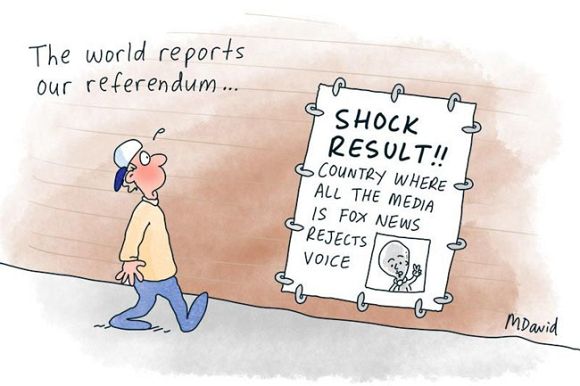Criticism has been aimed at journalists accused of leaning Left while those displaying partiality and Right-wing position-taking escape debate. Dr Victoria Fielding reports.
THERE HAS BEEN much criticism of journalists for “taking a position” in signing an open letter calling for better reporting on the Gaza war. Nine took the drastic step of banning their journalists who signed the letter from reporting about the conflict, out of fears they could not do so without “bias”. ABC staff were also warned not to sign such letters that might call into question their “impartiality”.
It is high time we talk about journalism and the dangers of conflicts of interest, position-taking and partiality. It is no coincidence that this discussion has only arisen out of fears journalists might take what is characterised to be a Left-wing position in supporting Palestinians, but no such debate occurs over daily Right-wing position-taking in Australian media.
This double standard tells you everything you need to know about where true bias and lack of impartiality exist.
It is telling that Nine journalists who signed the Gaza open letter were criticised by editors Bevan Shields and Tory Maguire who themselves had been recipients of sponsored trips to Israel, along with a who’s-who of Australian journalists and commentators.
Where was the outrage when journalists – including from the ABC – attended these trips without transparently declaring any resulting bias towards the views of Israel that resulted?
Here lies the hypocritical rub. Australian mainstream news outlets never show any outrage when their colleagues and competitors manipulate the craft of journalism to take overtly Right-wing positions in the aid of Right-wing causes. This propagandist use of media power is accepted as normal and the silence about it reinforces its impact.
Former Victorian Premier Daniel Andrews was finally able to tell us all what he really thought of media position-taking in his first interview post-retirement. He criticised the way “absolute pretenders” in the media were not reporters, were not journalists, but were “partisan” in taking positions against him and his government. He made the correct observation that this side-taking in political reporting has led to people turning off biased media, which ultimately harms society through its lack of informed citizenry.
Journalists should be calling out those who pretend they are doing journalism, when really they are, as Andrews described, inserting themselves into politics and trying to influence outcomes.
But we only hear any complaints about “position-taking” when journalists urge better reporting about the Gaza conflict by signing an open letter, which can hardly be characterised as trying to subvert the result of the war.
Side-taking was on full display throughout the Voice Referendum, with my study of News Corp’s Voice coverage, finding 96 per cent of the words used by News Corp staff – including commentators and reporters – took the side of “No”. News Corp, of course, famously takes the side of Right-wing causes on everything, yet we never hear journalists at other outlets criticising this.
Worse still, when partisan faux-journalists are criticised by non-journalists for taking sides, rather than joining the critique by backing up their profession and calling for more objective practice, journalists at other outlets circle the wagons and defend their partisan colleagues.
A great example of this wagon-circling occurred last week when Attorney General Mark Dreyfus said what we were all thinking in response to a partisan Sky News “journalist” asking him if the Government should apologise for the actions of released detainees who had been re-arrested. Dreyfus called the absurd question “absurd”, saying that the Government was following the rule of law.
In response, journalists at other outlets, including Nine’s James Massola, turned on Dreyfus, claiming he was the bad guy. As usual, journalists ignored the politically-driven motives behind the “question”, as they ignore the political motives of all reporting and commentary that comes out of News Corp.
Side-taking is not just a problem of News Corp. Last week, The West Australian newspaper made their views of Labor’s industrial relations policies clear with the headline, ‘They’re a dud’.
This front page “reporting” does not inform the public about what has happened to the passage of industrial relations laws in parliament, but instead is an overt attack on the Labor Government and the labour movement who worked collectively for years to improve workplace laws to benefit workers.
There was no criticism of this side-taking from other outlets, just as there never is when news outlets – under the façade of journalism – take Right-wing political, cultural and industrial positions.
When the media takes a position against position-taking asymmetrically by only calling out so-called Left-wing positions, and ignoring constant and unrelenting Right-wing position-taking, they are, ironically, taking a Right-wing position. The silence from other outlets when journalism content is exploited for Right-wing political ends is a tactic endorsement of Right-wing bias, normalising it and growing its power.
If journalists really want to defend their profession by calling for true impartiality, neutrality, independence and the pursuit of objective methods, they need to do so whenever these values are being corrupted in the name of political power. Anything else is hypocrisy.
Dr Victoria Fielding is an Independent Australia columnist. You can follow her on Threads or Bluesky.
Related Articles
- CARTOONS: Mark David is watching the news
- So-called 'progressive' media show true colours over Industrial Relations Bill
- Objectivity and accountability lacking in Australia's mainstream press
- Biased reporters should lose status as 'journalists'
- Who is PRGuy? PRGuy is all of us
 This work is licensed under a Creative Commons Attribution-NonCommercial-NoDerivs 3.0 Australia License
This work is licensed under a Creative Commons Attribution-NonCommercial-NoDerivs 3.0 Australia License
Support independent journalism Subscribe to IA.













